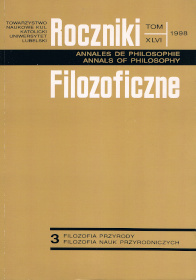Nature of Life in the Aspect of Organization
Abstract
The article consists of two parts: the methodological one and the one devoted to the subject itself. The former one includes a discussion on the choice of the research strategy for living systems. The choice is between the reductionist and antireductionist approaches. Reductionism is discussed in detail in the article, which means that the author did not confine himself to one of its options only, but on the basis of the abundant western literature he shows its various versions: the constitutive, explicative, theoretical, methodological, epistemological and ontological ones. Each of them is discussed both from the point of view of its victories and defeats. Antireductionism includes considerations of holism (strong, weak) in the aspect of its adequacy to explaining the autonomy of living systems. The author seeks conciliation of reductionism and antireductionism in emergetism.
The latter part of the publication is concerned with the problem of organization of living systems. It consists of two parts: the origin and the nature of life. The first one includes a discussion of various conceptions of the transition from phisis to bios. The article contains a review of numerous approaches to understanding of the mentioned transition. Particular approaches are discussed in several aspects: methodological, epistemological and . Hence this part of the article is a synthesis of the achievements in the question of understanding the origin of life. The author reduces the problem of the nature of life to pointing to the organization rules, to the algorithms that are decisive for biologism of the system. The stress in this question is put on information which, besides the matter and energy decides about the specific type of systems.
The article has the character of a review and synthesis. It is based on the literature published in the West. Its task is to show the reader the progress in interdisciplinaty knowledge that is concerned with the study of the organization of living systems. The material that is included in the article transcends the problems of philosophy of living nature.
Copyright (c) 1998 Roczniki Filozoficzne

This work is licensed under a Creative Commons Attribution-NonCommercial-NoDerivatives 4.0 International License.





